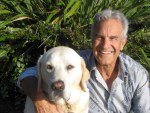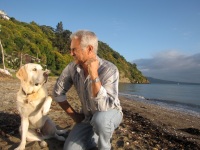Harambe, a 17-year-old male Western lowland gorilla (an endangered species with only about 175,000 left in the world), was shot to death on May 28 when a 3 year old boy fell 12 feet (seemingly without injury as he was seen then splashing in the water) into the moat surrounding the Gorilla enclosure at the Cincinnati Zoo, after he refused to relinquish the boy (protecting him? – he seemed to hold his hand and cradle him in his arms) when asked by his keepers.
Everyone wants to know what went through the mind of the gorilla. Alas, we cannot know. Needless to say, this is not something that Harambe would have faced before. He had no way of knowing what was the right thing to do, from a gorilla point of view (how often do gorillas meet children who fall into their space?), or from a human point of view even though he had been born and raised among humans. A powerful male, weighing over four hundred pounds, capable of crushing a coconut with his hands, he could easily have killed the boy. That he was with him for ten minutes (long ones from the point of view of the child, the understandably hysterical parents, and the frightened onlookers), and did not kill him speaks for some sense he must have had about not harming the boy. On the other hand, when you look at the full video (3-4 minutes long) you can see him dragging the boy through the water by his leg with no sense that he could be hurting him (he may have been disoriented by the shouting of the crowd above him, or he may have been trying to protect the boy from that very danger).
Professor Gisela Kaplan, from the Centre for Neuroscience and Animal Behaviour at the University of New England in Australia said, and I agree, that it was probable the gorilla had come to help the boy, not harm him, as the gorilla would realize the boy posed no threat. The gorilla may have thought, she suggests, that the boy was in danger from the screaming crowd above both of them. Gorillas will drag their young away from danger, and this is precisely what Harambe did.
While we can agree that it is almost impossible to know what was transpiring in the gorilla’s mind, the question I have is: what is going through the minds of people who insist on keeping other sentient creatures in zoos so that we can stare at them? What makes them think this is educational, or a noble enterprise, or keeping the animal safe? It is high time that zoos, ALL zoos, were abolished: all we learn from them is how to inflict harm on other animals. They serve no purpose to the animal other than to so distort his or her nature that they are unrecognizable. No wonder that some elephants are beginning to kill their “keepers” perhaps because enough is enough. If I were an elephant I would be thinking: What on earth are they thinking keeping me a prisoner here? Harambe the gorilla did not, in fact, harm the boy who was released from the hospital within hours, when he easily could have done so. This suggests to me that he “knew” in some deep sense, that the boy was worthy of life. If only we could feel the same about gorillas.
I cannot see how shooting the gorilla was the right thing to do. Watching the video, I was surprised that the onlookers did not form a chain and bring several people down to the enclosure to rescue the boy. It is possible that Harambe would have, as in the famous case of Binti Jua in Chicago in 1996, hand him over to a human. (But of course it is also possible he would have perceived the adults as endangering the child whose job it was to save!). But surely something else could have been tried rather than shooting the gorilla: imagine if they had only wounded him and he took out his rage on the child!
What if, what if, what if. Yes, all speculative, granted. But what is not speculative is that this accident would never have happened had gorillas not been put into zoos, where they definitively do not belong, in the first place. Best of all would be that there were no zoos to put any animal into. They are barbaric reminders of our past sense of human entitlement. Enough is enough for our own sake and the sake of other animals.









